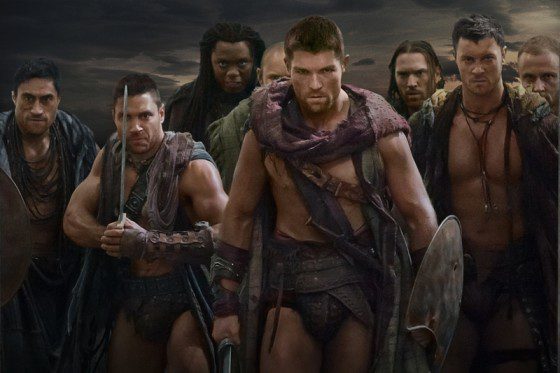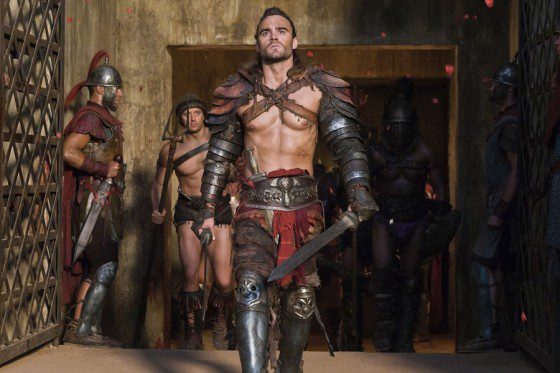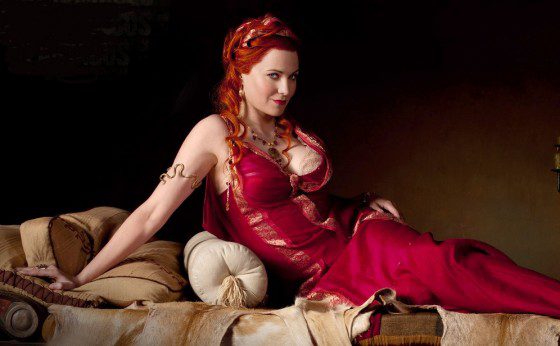I Would Have Words: The End of Spartacus

It’s been a few days since the series finale of Spartacus aired and I’ve had some time to digest it and it’s not only probably the greatest final episode I’ve ever seen, it’s one of the greatest episodes of TV, period. That’s just par for the course though for Spartacus, which is a great show, and not great in an ironic way or “so bad it’s great”, but legitimately great, Mad Men, Breaking Bad, Game of Thrones level of great. People like me who watched it loved it and everyone else either didn’t know it existed or never watched it. The show was so much more than just sex and violence and hopefully I can convince a couple of people to check it out (Possible Spoiler Warning).
The three main seasons of Spartacus, subtitled Blood & Sand, Vengeance and War of the Damned, retold the legend of the Roman slave Spartacus, who led a rebellion that came about as close as anyone to taking down the mighty Roman Empire. Andy Whitfield portrayed Spartacus for the first season before unfortunately passing away from cancer and Liam McIntyre stepped in for the final two seasons. Whitfield brought an intensity and rage in the first season that McIntyre never matched but he was able to perfectly capture the tactical and patient side of Spartacus in Vengeance and War of the Damned.
One of the strengths of Spartacus that no one probably would have predicted is the amount of character evolution and fleshing out that occured. Spartacus seemed like just a poor man’s Leonidas but eventually grew into a passionate, cunning and charismatic leader that everyone was willing to fight and die for. Other characters that seemed completely one dimensional became fully formed characters as well. Crixus, played by Manu Bennett, seemed at first like a stereotypical bully, alpha male type for most of the first season but when he finally joins Spartacus in the fight for freedom, he reveals himself to be a thoughtful and well spoken as well as being the most vicious fighter on the show and his relationship with Naevia (first played by Lesley Ann Brandt and then Cynthia Addai-Robinson) made things like learning how to behead a man with one strike of a sword seem like the most romantic thing on Earth. My favorite character though, and the one who maybe evolves the most, is Gannicus, played by Dustin Clare. Introduced in the mini seasons, Gods of the Arena, Gannicus is nothing but a whoring, drunken brute but his eyes open up to what is actually happening in the world and he eventually becomes the man who would be able to take on the mantle of Spartacus and lead the rebellion if anything were to happen to the actual Spartacus. If you know the history, than you know that most all the slaves were killed or crucified following the final battle with Marcus Crassus and you feel every death as characters you’ve grown to love are struck down in the finale.

It’s easy to make your heroes sympathetic and likeable but Spartacus also took the time to fully flesh out it’s villains as well. Some were just plain evil like the horrible husband/wife duo of Viva Bianca’s Illythia and Craig Parker’s Glaber but you fully understand their motivations, which makes it even more fun to hate them and see their ultimate comeuppance. Other “villains” are much more ambiguous. The villain of War of the Damned is Marcus Crassus, played by Simon Merrells, and he is not so much evil as just doing what he feels his is duty to Rome. He fully respects the skills and strategy of Spartacus and the entire War of the Damned season is a chess match between the two. Ironically, even though Crassus is trying to crush the slave rebellion, the love of his life is Kore, one of his slaves, which adds another layer of depth to his character. All the villains pale in comparision to Lucy Lawless’ Lucretia though.

In Blood and Sand, she proves herself to be the true source of power in the House of Batiatus by manipulating nobles and slaves a like in an attempt to elevate her and her husband’s (John Hannah) position but Gods of the Arena and Vengeance are where she truly reveals how insanely devious she can be. In Gods of the Arena, it’s revealed that she’s been slowly poisoning her father in law through his wine in an attempt to get him to leave the gladiator ludus in the hands of Batiatus and in Vengeance she has an amazing long con where she first pretends to be insane and then slowly rebuilds her friendship with Illythia until the gut punch of the final episode where it’s revealed that every action of Lucretia was in service of making sure Illythia gave birth to her child in the House of Batiatus and then Lucretia steals the baby and launches herself and the baby off a cliff in her attempt to rejoin Batiatus in the afterlife and their family can be complete. It works in the way the greatest twists work in that it makes you immediately want to rewatch the season with this new context and see how the machinations of the plan worked out. The fact that Lawless, or anyone on the show, was never nominated for an Emmy is a travesty.
But as much as Spartacus proved itself adept at character interactions and character growth, it was equally or more adept at delivering some of the greatest action sequences in TV and movies. When the show first started, it seemed like a cheap 300 rip off with a couple dozen extras trying to simulate an entire army and fake looking CG blood coming off of each strike. The show runner, Stephen S DeKnight, and his team quickly learned how to maximize their resources until every fight scene was a gorgeous, stylized display that the AV Club’s Ryan McGee beautifully described as “comic book splash pages”. There were panning shots of all the main characters engaged in various bad ass acts and they increased the blood to a ridiculous amount to amp up the visceral thrills of the show. It all culminates in the final battle which is one of the greatest staged and paced battles you will ever. There is a back and forth flow to the battle that raises your hope that the slaves will somehow defy history and win balanced out with another heartbreaking loss of a main character. The final confrontation of Spartacus and Crassus is a brutal, intimate battle between two men who respect each other but are duty bound to kill each other.
I haven’t mentioned the gratuitous nudity and sex yet but honestly, it becomes a background element where it just happens that lots of plot points happen while people are naked in baths or when naked slaves are around. I don’t know how accurate it is to actual Rome but it helps establish the extremes of how the characters in the Spartacus universe live. If you can’t handle it or not mature enough to not be distracted by it, than Spartacus is probably not the show for you.
Spartacus is a fantastic show that hopefully people will discover once the entire series is available on DVD. I would put any scene or character up against anything that the more critically acclaimed shows like Game of Thrones has to offer and hopefully in the coming years it will be recognized for it’s greatness. Gratitude to everyone involved in the show for an amazing run.
